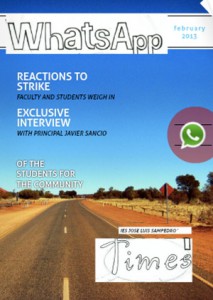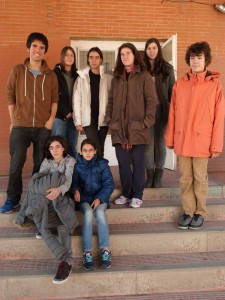Last week, the students of IES José Luis Sampedro released an online newspaper called the WhatsApp Times. The publication can be viewed by clicking here. The following is a story of my journey that led to the release. Enjoy!
Each person has a different opinion on whether luck exists or not. Some say all good things that happen in life are a result of luck. Others insist that luck does not exist. I prefer to believe the wisdom of an ancient proverb that reads, «Luck never gives; it only lends.» In May 2012, after graduating from Pitzer, luck lent me the opportunity to be a Fulbright English Teaching Assistant in Spain. As the summer started, I became filled with excitement as I thought of the hard and rewarding work ahead. Each day while I would sit in the reception desk at the San Francisco Mayor’s press office, I would think to myself: I wonder what the kids that I teach will be like. In the past, I had developed and implemented lesson plans to teach English as a Second Language to Mexican day laborers in Southern California. I had also taught private lessons in both math and Spanish but I had never been with a group of twenty to thirty students as either a teacher or teaching assistant. Little did I know at this time that Fulbright would really lend me the opportunity to work with smart, funny, and creative high school students. In September, after orientation, I settled down in the center of Madrid in a neighborhood called Barrio de Las Letras (Neighborhood of Literature) with two Spaniards, one German, and one Italian. From my home base, I would travel 30 minutes by commuter rail train to the city of Tres Cantos where the students and teachers awaited me.
In the second week of September, I received my class assignments for the year. I would be a primary teacher for Global Classrooms, also known as Model United Nations, and an English teaching assistant for music and art classes. Within the first month, I felt right at home. The students were eager to learn English and I was excited to teach them. The administration and faculty were both friendly and welcoming. As a teacher in Global Classrooms, I have had the opportunity to get to know my students very well. The small class size has allowed me to effectively teach students basic debating skills, how to form ideas and write essays, how to conduct research, and public speaking competencies. Thanks to their hard work for the last five and a half months, my students, along with kids from seventeen other public high schools in the region of Madrid, will go to the Global Classrooms Conference this upcoming week. At the conference, Sampedro students will act as representatives of the countries of Somalia, Mozambique, Argentina, Belarus, Morocco, and Saudi Arabia, and debate solutions to solve the problem of global water scarcity. In my art classes, I have had the opportunity to help students become critical thinkers. I have led debates that have helped the students think about the role of the geometry in making their art. I also have given lessons on English vocabulary for them to use to talk to me about their drawings. In my music classes, I have delivered varied lectures on American music and its roots. I have taught the students about anthems, both national and sports, in the United States and Spain. I have also done activities that strengthen understanding of more difficult concepts, like rhythm and dynamics. All in all, I have been very impressed with the students inside the classroom but also outside the classroom there have been many successes.
Over the last few months, I have had the wonderful opportunity to work with ten to fifteen students in the production of the WhatsApp Times, the first-ever English-language online-based newspaper at Sampedro. The first edition, which came out this past week, includes articles that range from breaking news, such as student responses to a new fence built around the southern perimeter of the institute, to opinion articles, such as a review of the bilingual program, to a column written by a student who reviews books for other students. The twenty-page first edition of the paper has allowed students to practice their English writing, speaking, and listening skills outside of their typical English courses as a supplement to the current bilingual program at the high school. Feedback from the students has been largely positive. One student wrote to me in an email last week, «Writing for the Whatsapp Times has been a really valuable experience. Although we write in English, the atmosphere has made me very confident. The WhatsApp team is awesome and makes the paper great.» The strong support from the school principal and the bilingual director have been instrumental to the success of the publication. As funds are tight around the school and all around the country, the paper is only online. That being said, this has only made the WhatsApp Times team more creative. Next week, we will prepare a campaign to publicize the newspaper that includes a contest on social media platforms, such as Tuenti and Twitter, to encourage fellow students to follow current news at the school. In addition, the school has hosted the WhatsApp Times and many other interesting projects on their website. As of this writing, students are working on their articles for the next issue. This project would not have been possible without the hard work of the students, faculty, and administrators.
The idea for the newspaper developed long before coming to Europe. Once at the school, I developed relationships with students and administrators that proved crucial in order to get participation and support. Finally in November, I worked with my bilingual director to write a proposal for the creation of the newspaper and present it to the principal. Upon approval from the principal, I worked with English teachers to advertise the project. The results were fantastic. After the first meeting, I put together a team of fifteen journalists and photographers. With this team, we worked hard over weekends and holidays to write questions, transcribe interviews, translate Spanish to English, write articles, peer edit, and finally, place articles in the newspaper. Although I asked for a lot from the students, their determination is clear as the same students showed up to the meeting for the second issue and they brought their friends. Thank you to the Fulbright Commission in Spain and the Regional Community of Madrid for lending me the opportunity to work with such gifted and talents students, faculty, and administrators.
Rio Bauce is a Fulbright Teaching Assistantship, or Auxiliare de Conversación del programa Fulbright, at Instituto de Educación Secundaria José Luis Sampedro in Tres Cantos. He received his Bachelor of Arts degree in American Government from Pitzer College in Claremont, California, 45 minutes east of Los Angeles. In his spare time, he is an avid cook, careful musician, novice soccer player, and serious language exchange participant. He regularly updates his blog called the BauceBeat that you can visit at http://baucebeat.wordpress.com. Rio is also a guest contributor to the Pitzer Fulbright Blog, which hosts the adventures of Pitzer College graduates of 2012 who have embarked on Fulbright Fellowships in several countries. He can also be reached with any questions or comments at baucer@gmail.com.

